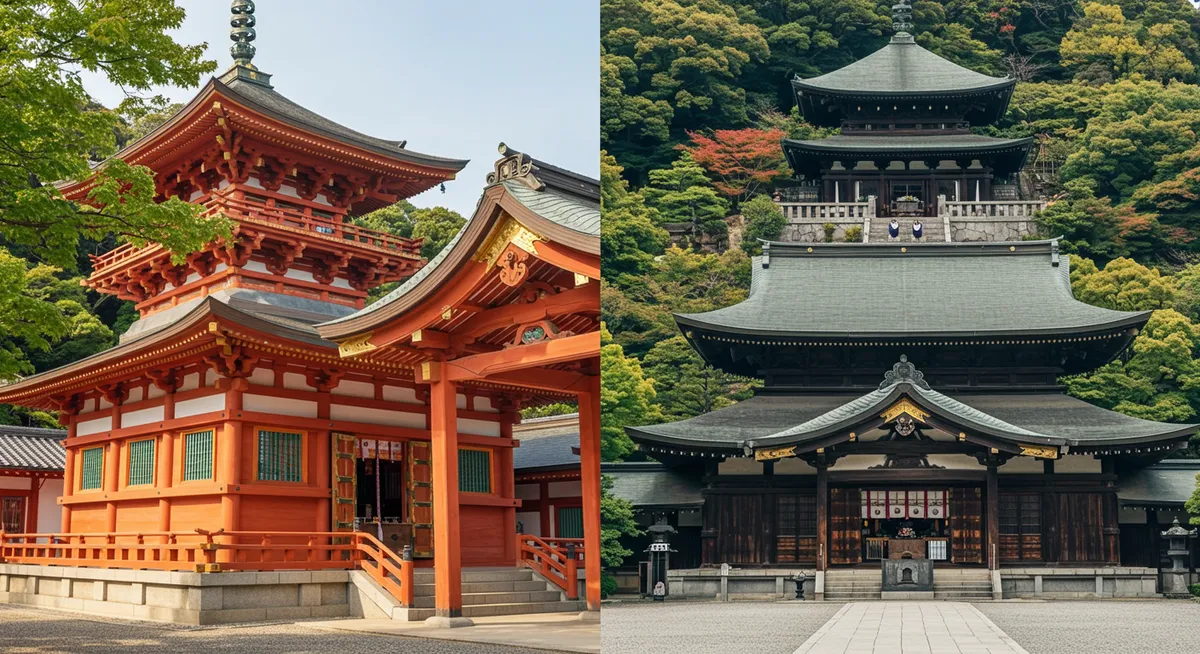
Hase-dera vs. Engaku-ji: Kamakura Temples Compared
Table of Contents
Want to find the best travel deals for this destination? Chat with our travel hacking specialist!
Get Travel HacksCategory: hasedera-temple-vs-engakuji-temple-kamakura-temples-comparison
Hase-dera Temple vs. Engaku-ji Temple: Kamakura Temples Comparison
Having explored Kamakura's spiritual landscape multiple times, I've come to appreciate the unique charm of its many sacred sites. When planning a trip to this historic city, visitors often find themselves weighing their options between prominent locations like Hase-dera Temple and Engaku-ji Temple. Both offer profound cultural experiences, but they cater to slightly different interests.
Hase-dera Temple: A Glimpse into Kannon's Realm
Perched on a hillside overlooking Sagami Bay, Hase-dera Temple is a vibrant and immensely popular site known for its eleven-headed Kannon statue, one of the largest wooden carvings in Japan. As you ascend, you’ll encounter thousands of tiny Jizo statues, dedicated to deceased children, which create a poignant and unforgettable sight. The temple complex also features beautiful gardens that change with the seasons, a small cave filled with Buddhist carvings, and truly spectacular coastal views. Indeed, I always recommend starting your visit here early, as the panoramic vistas from the observation deck are simply breathtaking. For a comprehensive exploration of the region, consider consulting a full Kamakura travel guide.
Engaku-ji Temple: Serenity and Zen Tradition
In stark contrast to Hase-dera's bustling charm, Engaku-ji Temple offers a profound journey into Zen Buddhism. This revered temple, a prominent head temple of the Rinzai school, is nestled amidst tranquil wooded hills, providing a serene escape from the city's lively pace. Founded in 1282, its historic buildings, including the impressive Sanmon gate and the Butsuden (main hall), exude a quiet dignity. Visitors can experience Zazen (seated meditation) sessions, fostering a deeper connection to its spiritual roots. The peaceful atmosphere here truly lends itself to quiet contemplation, making it an ideal stop for those seeking genuine tranquility. If you're planning a busy day, integrate this peaceful experience into your Kamakura day trip itinerary from Tokyo.
Hase-dera vs. Engaku-ji: Key Differences & Similarities
A direct Kamakura temples comparison reveals distinct characteristics. Hase-dera often feels more like a vibrant, diverse tourist attraction, blending religious reverence with stunning scenery and interactive elements. Its expansive grounds invite exploration, suitable for families or those wanting diverse photo opportunities. Engaku-ji, conversely, provides a quieter, more introspective journey, appealing to visitors interested in authentic Zen practices and ancient architecture. While Hase-dera boasts coastal views, Engaku-ji prides itself on its serene forested setting. From my perspective, both offer incredibly enriching spiritual experiences; it truly depends on your preferred pace and focus. Consider visiting during the best time to visit Kamakura Japan to fully appreciate their beauty.
Choosing Your Kamakura Temple Experience
Deciding between these two magnificent Kamakura temples depends largely on your personal travel style. If you appreciate panoramic views, unique religious art, and a bustling, diverse atmosphere, Hase-dera is likely your top choice. Its accessibility near the beach also makes it a convenient stop. Conversely, if tranquility, profound spiritual insight, and historical Zen architecture are your priorities, Engaku-ji offers an unparalleled experience. On my visits, I often combine them if time permits, starting early at Hase-dera and then seeking the calm of Engaku-ji. Getting to Kamakura is straightforward, whether by train or other means; understand how to get to Kamakura from Tokyo for seamless travel.
Frequently Asked Questions
What is the best time of day to visit Hase-dera and Engaku-ji Temples?
How far apart are Hase-dera Temple and Engaku-ji Temple?
Can I visit both Hase-dera Temple and Engaku-ji Temple in one day?
Ultimately, the choice between Hase-dera Temple vs. Engaku-ji Temple for your Kamakura itinerary comes down to your personal preferences. Hase-dera offers panoramic coastal beauty and vibrant Buddhist art, while Engaku-ji provides a profound immersion into serene Zen traditions amidst ancient forests. Both are quintessential Kamakura experiences, contributing significantly to the city's spiritual allure. Whether you seek breathtaking vistas or tranquil contemplation, your visit will undoubtedly be enriching. Plan your Kamakura journey carefully to truly savor the unique essence of each magnificent temple.